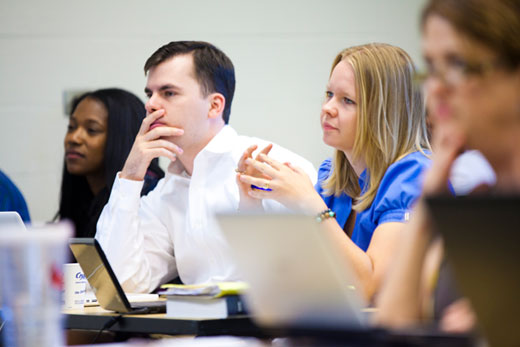In response to a challenging and rapidly changing job market, Emory Continuing Education (ECE) is refining its mission — expanding programs and partnerships with innovative new professional development opportunities.
That includes a series of new certificate programs, addressing topics that more closely align with the University's long-established strengths, including areas of health and sustainability.
Students may now earn certificates in predictive health, sustainability, event planning and fundraising, among a growing catalogue of certificate studies first launched in 2005. A certificate in project management is scheduled to begin in August.
It's a deliberate strategy and a move that mirrors national trends, as continuing education programs across the country are shifting focus from longstanding personal enrichment courses — such as yoga or oil painting — to classes that directly strengthen job skills, says Beverly Cormican, associate vice provost for continuing education and ECE executive director.
"We're responding to the reality of what's going on in our world," says Cormican. "To survive, you must be nimble and flexible and adaptive to the environment around you."
At ECE — formerly called the Center for Lifelong Learning, which has offered classes since 1951 — the new shift won't mean the disappearance of classes such as Pilates, gardening or photography. Not to worry, students will still find courses in literature and tai chi, assures Lisa Kozicki, ECE program director.
"Those are among enrichment components that will always remain a core component of our program," Kozicki says. "They speak to the mind-body-spirit connection, and make sense for us to offer."
Also continuing is the Osher Lifelong Learning Institute, which offers engaging classes for adults age 50 and above. Most ECE courses will still offer a 10 percent discount for Emory employees, she adds.
Classes that make sense
The new programs are the result of a rigorous self-examination for ECE, which is a self-sustaining division of Emory. The changes also answer a University-wide challenge for schools and divisions to seek creative new sources of revenue.
The result? "You are seeing a shift in who we are — our programs, our mission and our vision," Cormican says.
When Cormican arrived at ECE almost three years ago, she recalls being "wowed" to learn the division offered about 1,000 different classes, with topics stretching all over the map.
Today, that catalogue has been carefully pared to about 800 courses annually, selected for quality, focus and fit, she says.
"In the beginning, Emory Continuing Education was more community focused, with classes offered not necessarily with an eye toward Emory," Cormican explains.
From a program standpoint, it only made sense to build upon Emory's existing strengths and talents, she says. For example, with a law school on campus, it was logical to offer a paralegal certificate program — one of ECE's strongest performers.
So Cormican decided the time was right to "reach across the aisle" to partner with other successful Emory programs in a way that made sense for non-traditional adult learners.
This summer, ECE has partnered with the Emory-Georgia Tech Predictive Health Institute to launch a Certified Predictive Health Partner program, which is now accepting enrollment. With a blended format that includes online learning and in-class work, students will be trained as health partners, working with individuals on personal health issues, covering topics from blood analysis to health assessments and coaching skills.
For the Predictive Health Institute — which promotes health maintenance through proactive support rather than simply treating disease — the relationship is a good fit. Though the institute offers undergraduate, master's and doctoral degrees, the ECE certificate program fills an important niche, says Jennifer Vazquez, associate administrative director with the Predictive Health Institute.
"Now we're able to offer additional education to a professional already in the workplace — whether that's nurses working in the field, nutritionists, massage therapists, or fitness professionals, it opens predictive health to a new market," she says.
Building upon partnerships
The success of such partnerships is a model that Cormican would like to build upon.
Already, ECE has worked with Emory's Office of Sustainability Initiatives to offer a certificate in sustainability. Additionally, an event planning certificate program taught by Michael Kloss, chief of protocol and executive director of the Office of University Events, has proven so popular it exceeded initial expectations.
Conversations have also been launched with the School of Nursing to offer a course in emergency department nursing — which could help fulfill mandatory continuing education hours required of the profession.
"We're looking at more robust and flexible offerings that meet workplace and professional growth needs," Kozicki says. "We'll be using our resources more efficiently to help people get exactly what they need to get back to work or advance their careers."
Yet, in building partnerships and programs, they've been careful to consider where ECE could best serve unmet needs. Rather than compete with executive development programs at Goizueta Business School, for example, ECE has targeted classes aimed at individual contributors through mid-level managers, ranging from conflict management and technical writing to accent reduction — a course that has been popular with some of Atlanta's top companies.
Business-minded students may also earn certificates in management and human resources essentials, foreign language proficiency, web design, financial planning, grant writing, certified internal auditing and Six Sigma, the customer-focused problem-solving business model.
"Continuing education is a dynamic entity," Kozicki says. "What's happening here is what's happening in the public consciousness — people are seeing these classes as an investment. And companies are making the investment, too."
For more information or to register for classes, visit www.ece.emory.edu.

